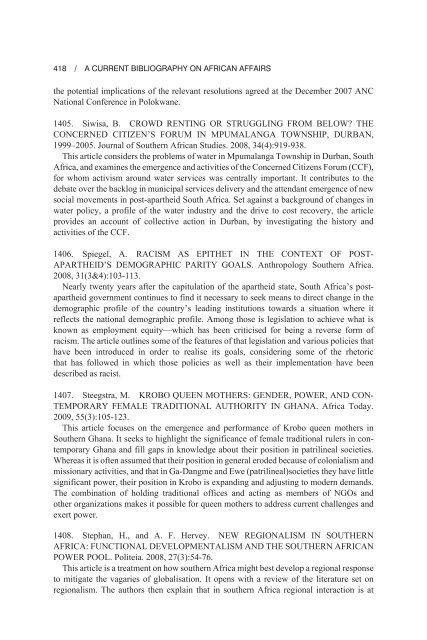A Current Bibliography on African Affairs - Baywood Publishing
A Current Bibliography on African Affairs - Baywood Publishing
A Current Bibliography on African Affairs - Baywood Publishing
Create successful ePaper yourself
Turn your PDF publications into a flip-book with our unique Google optimized e-Paper software.
418 / A CURRENT BIBLIOGRAPHY ON AFRICAN AFFAIRS<br />
the potential implicati<strong>on</strong>s of the relevant resoluti<strong>on</strong>s agreed at the December 2007 ANC<br />
Nati<strong>on</strong>al C<strong>on</strong>ference in Polokwane.<br />
1405. Siwisa, B. CROWD RENTING OR STRUGGLING FROM BELOW? THE<br />
CONCERNED CITIZEN’S FORUM IN MPUMALANGA TOWNSHIP, DURBAN,<br />
1999–2005. Journal of Southern <strong>African</strong> Studies. 2008, 34(4):919-938.<br />
This article c<strong>on</strong>siders the problems of water in Mpumalanga Township in Durban, South<br />
Africa, and examines the emergence and activities of the C<strong>on</strong>cerned Citizens Forum (CCF),<br />
for whom activism around water services was centrally important. It c<strong>on</strong>tributes to the<br />
debate over the backlog in municipal services delivery and the attendant emergence of new<br />
social movements in post-apartheid South Africa. Set against a background of changes in<br />
water policy, a profile of the water industry and the drive to cost recovery, the article<br />
provides an account of collective acti<strong>on</strong> in Durban, by investigating the history and<br />
activities of the CCF.<br />
1406. Spiegel, A. RACISM AS EPITHET IN THE CONTEXT OF POST-<br />
APARTHEID’S DEMOGRAPHIC PARITY GOALS. Anthropology Southern Africa.<br />
2008, 31(3&4):103-113.<br />
Nearly twenty years after the capitulati<strong>on</strong> of the apartheid state, South Africa’s postapartheid<br />
government c<strong>on</strong>tinues to find it necessary to seek means to direct change in the<br />
demographic profile of the country’s leading instituti<strong>on</strong>s towards a situati<strong>on</strong> where it<br />
reflects the nati<strong>on</strong>al demographic profile. Am<strong>on</strong>g those is legislati<strong>on</strong> to achieve what is<br />
known as employment equity—which has been criticised for being a reverse form of<br />
racism. The article outlines some of the features of that legislati<strong>on</strong> and various policies that<br />
have been introduced in order to realise its goals, c<strong>on</strong>sidering some of the rhetoric<br />
that has followed in which those policies as well as their implementati<strong>on</strong> have been<br />
described as racist.<br />
1407. Steegstra, M. KROBO QUEEN MOTHERS: GENDER, POWER, AND CON-<br />
TEMPORARY FEMALE TRADITIONAL AUTHORITY IN GHANA. Africa Today.<br />
2009, 55(3):105-123.<br />
This article focuses <strong>on</strong> the emergence and performance of Krobo queen mothers in<br />
Southern Ghana. It seeks to highlight the significance of female traditi<strong>on</strong>al rulers in c<strong>on</strong>temporary<br />
Ghana and fill gaps in knowledge about their positi<strong>on</strong> in patrilineal societies.<br />
Whereas it is often assumed that their positi<strong>on</strong> in general eroded because of col<strong>on</strong>ialism and<br />
missi<strong>on</strong>ary activities, and that in Ga-Dangme and Ewe (patrilineal)societies they have little<br />
significant power, their positi<strong>on</strong> in Krobo is expanding and adjusting to modern demands.<br />
The combinati<strong>on</strong> of holding traditi<strong>on</strong>al offices and acting as members of NGOs and<br />
other organizati<strong>on</strong>s makes it possible for queen mothers to address current challenges and<br />
exert power.<br />
1408. Stephan, H., and A. F. Hervey. NEW REGIONALISM IN SOUTHERN<br />
AFRICA: FUNCTIONAL DEVELOPMENTALISM AND THE SOUTHERN AFRICAN<br />
POWER POOL. Politeia. 2008, 27(3):54-76.<br />
This article is a treatment <strong>on</strong> how southern Africa might best develop a regi<strong>on</strong>al resp<strong>on</strong>se<br />
to mitigate the vagaries of globalisati<strong>on</strong>. It opens with a review of the literature set <strong>on</strong><br />
regi<strong>on</strong>alism. The authors then explain that in southern Africa regi<strong>on</strong>al interacti<strong>on</strong> is at




